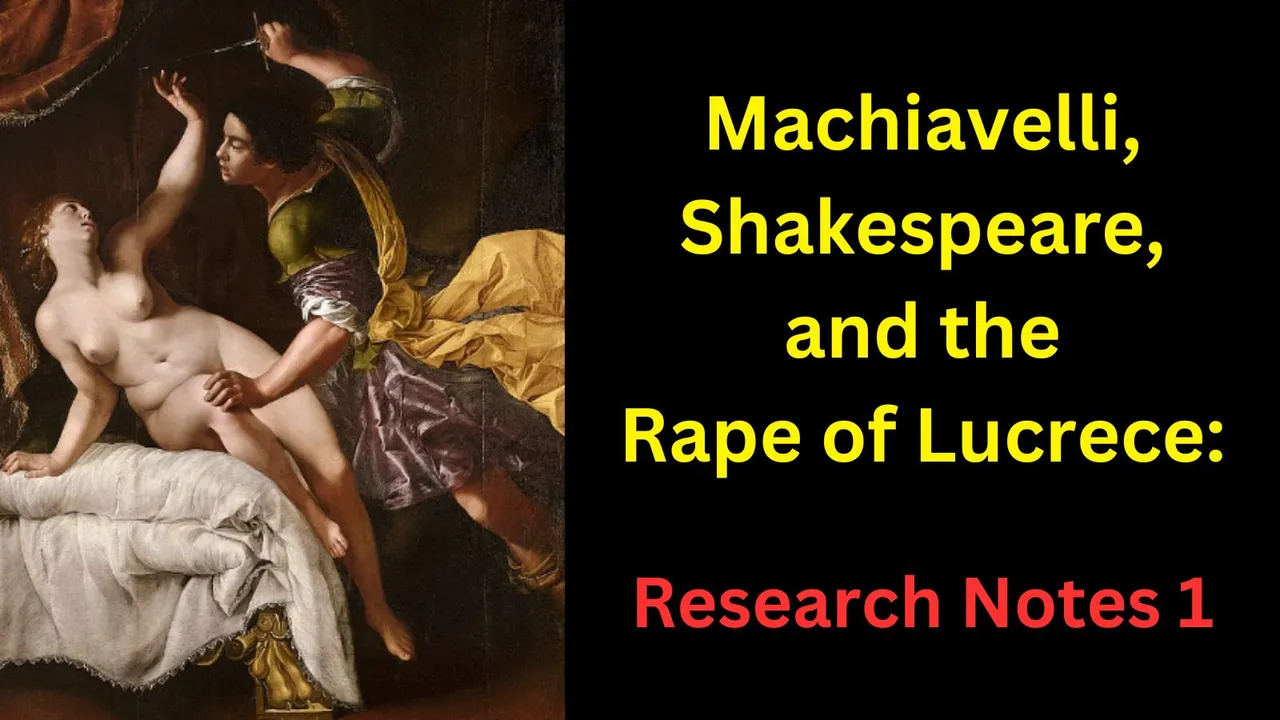
This is the first in a series of research notes towards a paper on Shakespeare's Rape of Lucrece that I may be presenting to an academic conference in Hiroshima in August 2024. This blog seems like a good place to accumulate and edit notes. I won't be providing any explanations except for my own reference in this series. Feel free to comment - I will certainly respond to any questions, feedback or insights. :)
The Rape of Lucrece in Roman, Medieval, and Renaissance Literature
Livy: Ab Urbe Condita
Valerius Maximus: Factorum et Dictorum Memorabilium (Book 6, Chapter 1) https://penelope.uchicago.edu/Thayer/L/Roman/Texts/Valerius_Maximus/6*.html
Ovid: Fasti (24th February)
Dionysius of Halicarnassus: Antiquitates Romanae
Plutarch: Lives - Poplicola
Jerome: Against Jovinianus, 46. https://journals.openedition.org/episteme/2253
Augustine: De Civitate Dei Contra Paganos (why suicide if innocent / why admired if guilty?)
https://faculty.washington.edu/miceal/lgw/lucretia/Augustine.htmlDante (1265-1321): Inferno IV: Brutus and Lucretia in the first circle of Hell.
Petrarch (1304-1374): The Canzoniere, ‘The Triumph of Chastity’, De viris illustribus, L’Africa (See Yves Winter, pp. 494-5)
https://petrarch.petersadlon.com/canzoniere.html?poem=262Boccaccio (1313-1375): De Claris Mulieribus, 46.
Coluccio Salutati (1331-1406): Declamatio Lucretiae (Yves Winter, p. 421)
Christine de Pizan (1364-c.1430): Le Livre de la Cité des Dames
https://en.wikipedia.org/wiki/The_Book_of_the_City_of_Ladies
https://journals.uniurb.it/index.php/linguae/article/view/4429/3868Leonardo Bruni (aka Aretino) (c. 1370-1444): (Yves Winter, p. 424)
Francesco Barbaro (1390–1454): (Yves Winter, p. 424)
@hirohurl/machiavelli-shakespeare-and-the-rape-of-lucrece-research-notes-5-yves-winterJohn Gower (1330-1408): Confessio Amantis (Lucrece "loses consciousness")
Geoffrey Chaucer (c. 1343-1400: The Legend of Good Women
Pietro Aretino (1492-1556): Dialogues ("the trend of naturalism in cynical libertine speculation about her motives..." https://www.jstor.org/stable/24777530
John Tyndale (c. 1494-1536): Obedience of a Christian Man (See John Roe: https://www.enotes.com/topics/rape-lucrece/criticism/rape-lucrece-vol-43/overviews/john-roe-essay-date )
William Shakespeare: The Rape of Lucrece
Thomas Middleton: Lucrece, 1594; The Ghost of Lucrece, 1600
Thomas Heywood: The Rape of Lucrece, 1608
Gifford Lecture: Lucretia and the Politics of Sexual Violence, Mary Beard
- Mars rapes Rhea Silva, vestal virgin, who bears Romulus and Remus (wolf sacred to Mars).
- Romulus et al rape the Sabine women
- Rape of Lucretia
- Rape of Virginia
According to Livy, Lucretia kills herself so as not to provide an excuse to other women.
Lorenzo Lotto's portrait of Lucretia includes a quotation from Livy:
nec ulla impudica Lucretiae exemplo vivet
(no unchaste woman shall live by Lucretia's example)
https://en.wikipedia.org/wiki/Portrait_of_a_Woman_Inspired_by_Lucretia
If she was innocent, why did she commit suicide?
If she was guilty, why is she an example of chastity?
Augustine
William Vaughan: She was complicit.
Coluccio Salutati: She may have enjoyed it.
Succubuit famae victa puella metu
The girl gave in, conquered by fear of bad reputation.
(The girl, overcome by fear, submitted to celebrity.)
Ovid
Artists who painted the Rape of Lucretia
- Botticelli, Story of Lucretia (1496-1504) https://en.wikipedia.org/wiki/The_Story_of_Lucretia_(Botticelli)
- Lorenzo Lotto, Portrait of a Woman Inspired by Lucretia (1533) https://en.wikipedia.org/wiki/Portrait_of_a_Woman_Inspired_by_Lucretia
- Titian, Tarquin and Lucretia (1571) https://en.wikipedia.org/wiki/Tarquin_and_Lucretia
- Artemisia Gentileschi, "Lucretia" (1642)
Gentileschi herself was raped by Agostino Tassi (who was influenced by Caravaggio) and tortured to check her evidence.
Pushkin's parody of Lucretia: Count Nulin (1825)
Shakespeare's Patterns of Self Knowledge, Rolf Soellner
Part 1, Humanism and Antihumanism
Chapter 1 Nosce teipsum: Learning the Method
P. 12. Cicero's theory of moral decorum.
- Lucrece appeals to Tarquin's "likeness" to a man and a prince:
- As a man he must control his appetites,
- As a prince he must be a model to his subjects.
- He should observe decorum.
Begin here: Machiavelli on the uselessness of this.
Shakespeare's Lucrece uses Ciceronian arguments to try and persuade Tarquin not to rape her.
p, 13 Tarquin's artistic decorum, but lack of moral decorum.
The Theme of Rape in Elizabethan and Jacobean Texts, Stephanie Schnabel
Paul Edmondson's nonsensical "second rape." (129/2408, Kindle)
Footnote 37: Gardiner: Women in Roman Law, p. 121 (208/2408, Kindle):
- "In the case of a married woman having been raped, a pregnancy even brought up more problems and damage to the family honour."
Footnote 54: Bains, Effacing Rape: How Women Should Supply Evidence (243/2408, Kindle)
